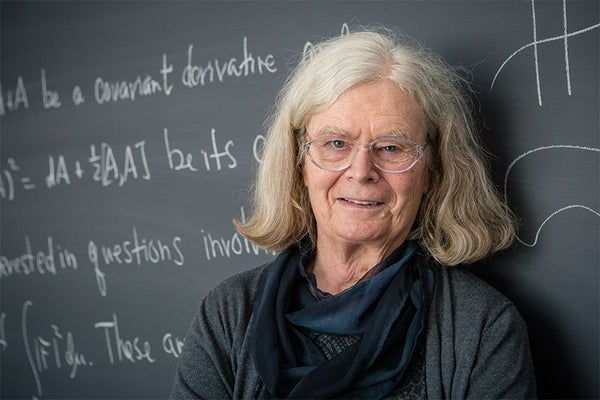Karen Uhlenbeck has spent most of her career as a mathematician “chipping away at problems,” she says—but occasionally she’ll have a revelation, and the solution to a quandary that has been plaguing her will finally become clear. “Those are really the high points,” she says.
Those breakthroughs have come often enough that the 76-year-old will be awarded this year’s Abel Prize, a prestigious honor bestowed annually since 2003 by the Norwegian Academy of Science and Letters. Uhlenbeck is the first female mathematician to win. The academy cited her “pioneering achievements in geometric partial differential equations, gauge theory and integrable systems, and for the fundamental impact of her work on analysis, geometry and mathematical physics.”
Born in Cleveland to an engineer and an artist, Uhlenbeck discovered her love of math as an undergraduate at the University of Michigan, and went on to earn a PhD in mathematics in 1968 from Brandeis University. She retired in 2014 from the University of Texas at Austin, where she is currently a professor emerita of mathematics and Sid W. Richardson Regents Chair. She is also a Visitor in the School of Mathematics at the Institute for Advanced Study in Princeton.
On supporting science journalism
If you're enjoying this article, consider supporting our award-winning journalism by subscribing. By purchasing a subscription you are helping to ensure the future of impactful stories about the discoveries and ideas shaping our world today.
Uhlenbeck spoke to Scientific American about her life in math, the problems she never solved, and what a day on the job is like for her.
[An edited transcript of the interview follows.]
Congrats on your award! What does this mean to you?
I’m not quite sure what it means to me. Right now, it means I have a lot of interviews, and there are a lot of young women looking up to me. I hope I’ll grow into it.
When did your interest in math begin?
I didn’t know that you could even be a mathematician when I was growing up. I read a lot of books in science—physics and astronomy—and I saw myself being a physicist. But in my freshman college calculus class, as soon as I grasped that you had certain rules and could do all sorts of interesting things within the framework of mathematics, I just fell in love with it. I also found dealing with lab partners in science classes very difficult. In math, I was on my own.
Do you still enjoy working alone?
I like to work alone, and I do most of my thinking alone, but I find it absolutely necessary to have other people to talk to now. I need to see how my ideas are panning out. If I don’t have a collaborator I often end up solving a problem and then don’t publish because I lose interest.
As a mathematician, what does an average day on the job look like for you?
I’m retired now, but a day today is not all that different than when I worked—except I’m not teaching. I get up, and I often swim or go to the gym in the morning. Then I do some bookkeeping, check up on all the doctor’s appointments I have and anybody who critically wants something from me. Then I go to a seminar or two, or I meet with a collaborator and we talk math.
When I’m working on a problem I usually sit down and think through what I know, and make notes and try out a few estimates, do some inequalities. Maybe I go look up a reference. And then I probably get stuck and go on to think about something else. I actually don’t save my notes; every time I sit down to look at a problem I tend to start thinking it through fresh to see if I find a different way to approach it.
What does it feel like when you finally make a breakthrough?
Absolutely fantastic. There’s nothing like it—when you suddenly think, “Can that really be true? My god, I’ve got a theorem.” It’s so exciting. These moments don’t come all that often. There’s always a point where you wonder, “Am I ever going to prove another theorem?” But I keep going to seminars and thinking about ideas and looking for places where maybe I can have some insight into some questions.
Have you worked on problems where that breakthrough never comes?
Oh yes, sadly yes. I would dearly love to understand something about gauge theory with non-compact groups, for example, but that’s a difficult subject.
Gauge theory is a field where you did some of your most famous work. How did you get involved?
In gauge theory, the equations I worked with are partial differential equations called the Yang-Mills equations, and they were very important in particle physics. Subsequently they’ve had applications in string theory. Physicists were extremely interested in the solutions, and this was really the beginning of a flowering of discussions between mathematicians and physicists. Both discovered they had something to give each other. This happened in the 1960s, and when I came along in the seventies, there were some open equations in physics that in fact I was able to solve.
How do you choose which problems to work on?
I just follow my nose. I spent many years in the past couple decades working on integral systems, and the reason is because physicists started working on them and I wanted to understand why these systems appear in physics. I’m not sure I understand it; this is one of the places where I feel I kind of failed to understand the question.
